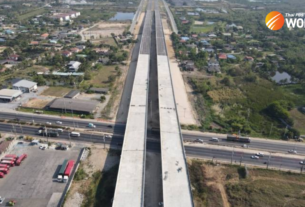THE NATION
The Sino-Thai bullet-train project should advance the interests of both countries, observers say. A Transport Ministry source notes that the attempt of Thailand to make the project happen soon could bring unwelcome consequences to the country. No evaluation has been conducted yet on all the economic impacts of the project on the country.
However, the government has pushed ahead with the project with considerable enthusiasm, as the high-speed railway will help save energy, will boost trade between Thailand and China and could help bring prosperity to Thailand’s densely populated Northeast, which has low per capita income.
The railway will link Thailand, China, Laos, Malaysia and Singapore.
Chinese Ambassador Guan Mu has said the project can be divided into the eastern route linking China with Vietnam and Cambodia; the western route connecting China with Burma, India and Bangladesh; and the central route passing through Thailand, Laos and Malaysia to Singapore.
Recently the subcommittee preparing the memorandum of understanding for the project recommended that the two countries set up a joint venture, with Thailand holding the majority share of 51 per cent, to run the project.
The JV would have the right to construct the project and provide the service for 30 years, with automatic renewal for 20 years. The company will set up a subsidiary to operate the train service.
The subcommittee will make the proposal to Supoth Sublom, the ministry’s permanent secretary, who chairs the project working committee, for his consideration. Then Thailand will forward the details for discussion with China. If both sides agree, the ministry will propose it for Parliament’s approval so the two parties can sign the MoU in March or April.
The project will take one year for an economic and engineering study and four years for construction.
The super-express trains are expected to start running in 2015.
The progress on the project by the two countries has been remarkable. In June 2009 Prime Minister Abhisit Vejjajiva and Chinese President Hu Jintao discussed collaborating on regional economic development, especially between northern Thailand and southern China.
Parliament has also approved the framework of the MoU, which has led to the talks on the details of the project.
Thailand has also tried to reduce the obstacles to their joint investment. The Finance Ministry is now seeking an amendment to the Private Participation in State Undertaking Act to cut the approval process from 48 months to 12-18 months.
Supoth has said that in the initial talks, China wanted to see the development of three main routes, especially Kunming-Vientiane-Nong Khai, totalling 580 kilometres.
This route is expected to take four years to complete. Its feasibility study is expected to be ready in the first half of this year.
Another ministry source pointed out that one of the project’s benefits was that it would turn Thailand into China’s gateway to trade with India and Europe. Since the pro forma internal rate of return is only 13 per cent, the project is not attractive enough to draw investors, which are interested only in the train project itself.
Beijing has long planned to position Thailand as the route linking southern China to the Andaman Sea and beyond to South Asia and Europe.
The source said it remained to be seen whether the government could see the MoU inked before Parliament is dissolved.


